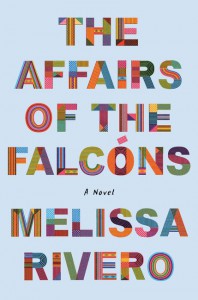The Affairs of the Falcóns by Melissa Rivero

There’s a real dearth of books about undocumented Spanish-speaking immigrants in the United States. I read in large part to learn about other people’s experiences, and this is a community that’s so nearby and yet so foreign to most Americans. I think what I really want is a popular ethnography – something like Just Like Us, but more representative; something like Two Dollars a Day, but about undocumented immigrants – but memoirs, and fiction by people who know what they’re talking about, can be great too.
So I came to this book with great hopes: it’s about a family of undocumented Peruvian immigrants living in New York in the mid-90s, written by an author who was an undocumented Peruvian immigrant herself as a child. And if this book helps other readers to better understand and sympathize with people in the characters’ situations, then that is a wonderful thing. But this one didn’t work for me as literature, and frankly I wound up not really understanding or sympathizing much with its protagonist either.
The book covers about a month in the life of Ana, a 27-year-old married mother of two who is determined to make a life for herself and her family in New York, but faces serious financial difficulties and family strife. She, her husband Lucho, and their 6-year-old daughter and 5-year-old son, are currently living in one room in Lucho’s cousin’s apartment; unfortunately the cousin has never liked Ana, Lucho has recently lost his job, and when Ana discovers she’s accidentally pregnant again, she knows they can’t afford it.
Unfortunately, the characters and writing are flat. Nobody has much personality, though everyone – Ana included – has a nasty tendency to kick everyone else when they’re down; I wasn’t sure whether this was meant to be an unfortunate result of their poverty and long-term stress or just a cheap technique to keep enough conflict in the book to tell a story with, but it tended to feel like the latter. It’s a quick, easy read, but the writing is bland, and though everyone is supposedly speaking Spanish, it doesn’t feel like it; characters say things like “Yes, I do,” which don’t really translate (Spanish doesn’t use the helping verb “do”). The plot is lacking too, mostly consisting of Ana going around arguing with her friends, family, and neighborhood loan shark. And the writing has a tendency to over-explain concepts and feelings in a very simplified way.
Then there’s Ana, our protagonist, who is by turns baffling and unsympathetic. Ana grew up poor, in a small village, is of mostly indigenous descent, and seems to have little education, yet is inexplicably married to Lucho, who grew up privileged in Lima, is of Spanish descent and college-educated and a professional. Predictably, the two don’t understand each other or communicate at all, and I was never convinced by Ana’s insistence that at some point they’d fallen in love; their marriage seemed more like a device to educate readers about differences of class and ethnicity within Peru than a real relationship. Ana doesn’t understand why Lucho would care about having a fulfilling job rather than doing menial labor, and seems to see this as a frivolous desire; meanwhile she doesn’t consult him about major decisions affecting their marriage, then becomes enraged when he doesn’t appreciate the sacrifices she’s kept to herself. I didn’t understand why Lucho would have agreed to immigrate illegally in the first place – couldn’t he have gotten a visa to go to Spain, as his brother did? – especially since this leaves their kids, too, leading an insecure existence when his background might have afforded them better opportunities back home. As the family’s problems compound and their reasons for being in the U.S. are stripped away, it seems as if Ana prefers to make her whole family third-class non-citizens in New York rather than being a second-class citizen by herself in Peru. Aside from all that, she just comes across as an unpleasant person; for instance, when the cousin’s husband – who is consistently kind to her and sticks up for her to his villainous wife – confesses that his wife can be abusive, her response is an internal tirade about how he, with his own home and money, has no right to feel sorry for himself, and she hopes his kids will abandon him (sure, he had an affair, but yikes).
So, overall, this book was a quick read but didn’t do much for me, and features characters who seem unrepresentative of undocumented immigrants in ways that make them less sympathetic. It didn't help that I got the sense we were supposed to take Ana's side and see her as a heroine instead of the deeply flawed and difficult person that she is, but even without that issue, this book is awfully simplistic. Hopefully someone else will tackle this topic more successfully.





